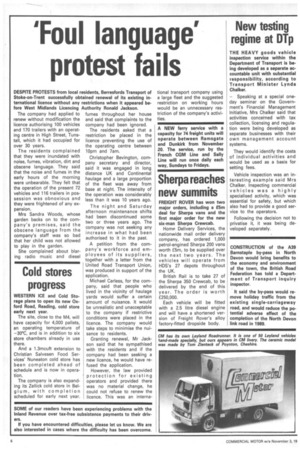'Foul language' protest fails
Page 8

If you've noticed an error in this article please click here to report it so we can fix it.
DESPITE PROTESTS from local residents, Berresfords Transport of Stoke-on-Trent successfully obtained renewal of its existing international licence without any restrictions when it appeared before West Midlands Licencing Authority Ronald Jackson.
The company had applied to renew without modification the licence authorising 100 vehicles and 170 trailers with an operating centre in High Street, Tunstall, which it had occupied for over 30 years.
The residents complained that they were inundated with noise, fumes, vibration, dirt and obscene language. They said that the noise and fumes in the early hours of the morning were unbearable. They felt that the operation of the present 72 vehicles and 116 trailers in possession was obnoxious and they were frightened of any expansion.
Mrs Sandra Woods, whose garden backs on to the company's premises, said the obscene language from the company's staff was so bad that her child was not allowed to play in the garden.
She complained about blaring radio music and diesel fumes throughout her house arid said that complaints to the company had been ignored.
The residents asked that a restriction be placed in the licence preventing the use of the operating centre between lOpm and 7am.
Christopher Bevington, company secretary and director, said it was engaged in long distance UK and Continental haulage and a large proportion of the fleet was away from base at night. The intensity of the operation was considerably less than it was 10 years ago.
The night and Saturday afternoon maintenance shifts had been discontinued some two or three years ago. The company was not seeking any increase in what had been authorised to it in the past.
A petition from the company's workforce and employees of its suppliers, together with a letter from the United Road Transport Union, was produced in support of the application.
Michael Carless, for the company, said that people who lived in the vicinity of haulage yards would suffer a certain amount of nuisance. It would be unrealistic and unacceptable to the company if restrictive conditions were placed in the licence. The company would take steps to minimise the nuisance to residents.
Granting renewal, Mr Jackson said that he sympathised with the residents and if the company had been seeking a new licence, he would have refused the application.
However, the law provided protection for existing operators and provided there was no material change, he could not refuse to renew the licence. This was an interne tional transport company using a large fleet and the suggested restriction on working hours would be an unnecessary restriction of the company's activities.








































































































